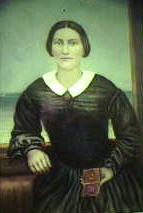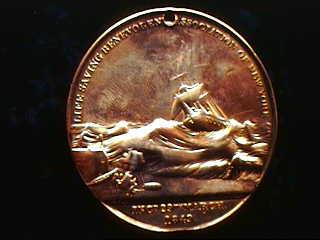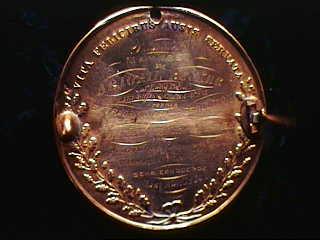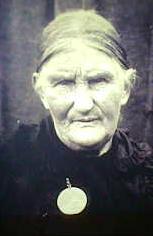Abigail Becker

Photo Courtesy of The Norfolk Historical Society
The Heroine of Long Point
Harry Barrett's Lore & Legends
No account of Long Point would be complete without the story of the woman known the length of the Great Lakes during her lifetime as the "Angel of Long Point".
Abigail Becker was the first born of a Dutchman and Loyalist, Elijah Jackson, who left New York State for eastern Ontario and eventually settled in Townsend, in Norfolk County. In 1848, at age seventeen, she married a Walsingham widower, Jeremiah Becker, who made his living as a trapper and fisherman in the marshes of Long Point. With him came an instant family of five boys and a girl; Abigail was to add to it by bearing him three girls and five boys.
Since Jeremiah spent so much of his time on Long Point, he decided to build a home there. In the lee of the foredune a mile or so west of Courtright Ridge and what came to be known as the breakwater, he built a rough cabin from the lumber that lay strewn along the beach.
Abigail loved this home among the dunes and seems to have had no fears of the isolation or of the winter storms that would often prevent Jeremiah from returning from his day's trapping or from the trips he made periodical-ly into Port Rowan to barter his pelts for supplies.
One night four exhausted seamen appeared at the cabin at the height of a bitter storm. Their ship had foundered far up the beach, but all six of her crew had miraculously reached safety through the pounding surf. Their ordeal was far from over, however, as their clothing had frozen and the driving sleet had added a coat of ice to their shivering bodies as they walked up the beach for hours.
The four had no sooner staggered into the glowing warmth of the Becker cabin than they told Abigail of their two shipmates who had fallen by the way on the exposed and storm-swept beach. Courageously, Abigail left her daughter to tend the wants of the men, while she and two of the boys set out into the snow-filled darkness to find the missing men.
She did find them, but they were more dead than alive. Even her promise of warm clothing and a hot meal failed to rouse them from their torpor. Eventually, however, Abigail and her sons carried the two exhausted men to the warmth and safety of the cabin. The next day the storm abated, Jeremiah returned, and the sturdy seamen were sufficiently recovered to gain the mainland.
Not long after, another schooner foundered in the sand bars of the south beach. The crew were taken off safely except for the cook. She had been in her cabin below decks during the storm, and it was assumed that in the excitement the unfortunate woman had been washed overboard before anyone even saw her come on deck. The ship settled into the offshore shoals, providing a supply of clean, fresh water within its hold. As the wreck lay just off the beach opposite the Becker cabin, it offered a ready source of sweet water for the family, more convenient than that they usually used.
One morning Abigail sent one of her daughters with a bucket on a line to dip water from the ship's hold. The child soon came running back, calling, "Mother, Mother, there is a woman in the schooner and she is waving to me." Abigail went to investigate. Through an open hatch, the watery beams of a winter sun sent green shafts of light through the black and quiet water. As her eyes gradually became accustomed to the darkness, she could see first the white but serene face of a woman, then a halo of hair moving gently as the ship rocked under the impact of each succeeding wave, and finally the wraith-like outline of a woman floating with outstretched arms. Obviously the cook had never left her bunk when the ship foundered. Now, months later, her body, which had been preserved by the cold water, had floated free to appear as if beckoning from the hold.
The experience does not seem to have upset Abigail unduly, for she and her family remained in the cabin among the dunes, to the great good fortune of another shipwrecked crew.
The autumn of 1854 had been mild and comparatively storm-free. The brisk, sunny days of October and November had allowed Jeremiah and Abigail Becker to lay in plentiful stores of food and fuel wood lest the good weather augur a long winter's siege. The morning of November 24 dawned bright and clear, with light breezes out of the southwest. Jeremiah Becker loaded his skiff early and set out for Port Rowan. His wife, sensing impend-ing trouble, was uneasy and suggested he wait another day, fearing for his safety crossing the inner bay if the wind, which seemed already to be freshening, should catch him on the open waters. Laughing at her concern, he agreed to hug the marshes on his way in. Still feeling vaguely uneasy, the twenty-three-year-old Abigail strode purposefully to the highest point on the dunes behind the cabin to scan both the open lake and the marshes for any sign of trouble. Towards late afternoon, the children, sensing their mother's uneasiness, came too; the youngest grasped her mother's flapping skirt to steady herself against the wind that had now swung into the west and was rapidly raising white caps that angled in, in long, roaring breakers. When Abigail turned to look across the marshes, she could see that the inner bay had rolling whitecaps, too.
By nightfall gale-force winds howled over Long Point, and the roar of the breakers allowed Abigail only fitful slumber as she lay worrying whether any schooners were caught on the lake.
Her fear was justified. The previous day the three-masted schooner Conductor had taken on the last of 1O,OOO bushels of wheat in Amherstburg harbour. Captain Robert Hackett had sensed an impending storm, but he had insisted on sailing immediately because he knew that few days of good weather remained to him and he feared being unable to deliver his cargo to Toronto. He also felt that he could make the Long Point Cut before the storm had gathered sufficient force to be a threat, and, if necessary, he could ride it out in the comparative safety of the inner bay.
By dusk of November 24, the wind was strong, the schooner was scudding along under close-reefed sails, and Captain Hackett was forced to rely on dead reckoning for his position as the combination of driving snow and a moonless night gave him little opportunity of sighting the Old Cut lightship or familiar landmarks ashore.
Deceived by the snow and howling wind, about midnight the Conductor struck the outer bar a half-mile off the south beach. The breakers lifted her clear, but she then swung to port and luffed up into the wind to crash broad-side into the second bar and heel over. Taking on water as one mountainous sea followed another over her decks, she quickly sank until her decks were awash. The crew could do nothing but scramble for safety into the rigging, where they lashed themselves to the masts and prayed that their ship would not break up before daylight. Their yawl boat had been torn clear of the chocks and davits and they realized their only hope would be to swim ashore in the daylight. They also knew that any chance of survival in those sand-filled, angry breakers and the treacherous undertow they created was minimal.
Abigail Becker was astir early following a restless night. She built up the kitchen fire for breakfast before going down to the beach for a bucket of water. As she cleared the foredune, she saw the yawl boat of the Conductor in the pounding surf. No seamen were to be found, but with a sinking heart she hurried along the beach. Soon she saw the eight forms huddled in the rig-ging. She waved frantically and, with a feeling of relief, observed an answering wave from one or two of the men.
Realizing she could not summon help from anyone else, she hurried back to her children. "There is a vessel aground down the beach: we must hurry if we are to help them," she said. She and the older children hurried down the beach, carrying matches, tea, a kettle, and blankets. The children quickly gathered driftwood to build a fire over which the kettle was soon sputtering. Abigail, though she could not swim a stroke, girded her flowing skirts and waded into the breakers shouting encouragement to the men.
Captain Hackett and his crew discussed their chances of survival should they put their lives in the hands of the woman who stood beckoning to them. Finally, Captain Hackett exclaimed, "If we remain here much longer we are certain to be lost. On the other hand with her help we may reach shore in safety." Kicking off his boots and throwing his greatcoat ahead of him, he called out "If I make shore successfully the rest of you follow, one at a time.
The Captain plunged in and started swimming strongly towards shore. But as a sea threw him forward, his mouth and eyes filled with sand. He struggled to gain a secure footing in the shifting sands, but his strength failed and the undertow began to carry him back. Then Abigail dashed in to catch the collar of his coat. Half carrying him, she struggled shoreward and laid the semiconscious man by the fire. She poured a mug of tea for him before returning to the beach to encourage the next man to swim for it.
Realizing that time was precious, the mate, Jerome, swung clear on a hal-yard to lower himself in the lee of the schooner's hull. He fared well, too, until the treacherous undertow swept his feet from under him. Like his cap-tain, weakened by exposure and cold, he began to be swept out into deep water. Captain Hackett, in spite of Abigail's remonstrances, dashed to Jerome's rescue, only to suffer the same fate. As the mate clutched him in the fatal embrace of a drowning man, it appeared they both would be carried off, but with a superhuman effort, Abigail grabbed an arm of each and dragged the two half-drowned men out of the reach of the undertow.
One by one, five more seamen plunged from the rigging into the icy waters of the lake, and one by one Abigail Becker met them as they strug-gled against the returning waters of each succeeding wave and brought them safely to her fire. At one point her crippled son rushed to her aid, only to have his crutch sink in the shifting sand, leaving him to the mercy of the churning waters. Again Abigail successfully saved both a seaman and his would-be rescuer.
What a long, nerve-wracking day it must have been for all of them. Hav-ing given her shoes to one of the men whose feet were frostbitten, Abigail moved among the men and into the surf in bare feet. It was bitter cold, and her clothing, like the sailors' stranded aloft, was soon encased in ice, but she worked on tirelessly.
Finally, all but the unfortunate ship's cook were safely ashore. He could not swim and chose to remain in the rigging of the foundered ship. As the storm raged with unabated fury, his shipmates agreed nothing could be done for him.
The short winter day was almost spent and the group moved from their beach fire to the cabin. But that night she and the men could sleep only fit-fully in the crowded quarters as they worried over the safety of the cook.
The next morning the wind had dropped and the men built a raft of timbers on the beach. They poled it out alongside the battered schooner and, with considerable difficulty brought the cook ashore, more dead than alive.

Photo Courtesy of Harry B. Barrett
As the story of Abigail's courageous rescue became known among the captains and crews of the ships that plied the Creat Lakes, they spread the tale far and wide. She received a number of honours, many of them through the efforts of E.P. Dorr, a local captain. A banquet was given in her honour in Buffalo, at which she was given a purse of $500, most of it contri-buted by sailors. A letter signed by Queen Victoria herself acknowledged her feat and enclosed a gift of £50. In 1860 the Prince of Wales presented a further gift while he was duck hunting on Long Point. And the governor- general sent a belated congratulatory letter in the 1890s.
The Benevolent Life Saving Association of New York wished to recognize the heroine. President Joseph Walker wrote Captain Dorr: "The giving of our medal is confined to the saving of American life. If thee wilt find that there was an American life saved from on board Schooner Conductor, Abigail shall have our best medal."
On enquiry, Captain Dorr learned that Jerome, the mate, and a crew member were, in fact, American seamen. The medal was struck and sent to the captain with instructions to obtain a receipt for it. He sent it to the col-lector of customs in Port Rowan, who was nonplussed for a moment when, on asking that Abigail give him a receipt for the medal, discovered she could not write. But he solved the problem by suggesting she accompany him to a photographer's where a daguerrotype was taken of Abigail proudly display-ing her new bible and the medal. The large gold medal is inscribed:

Photo Courtesy of Harry B. Barrett

Photo Courtesy of Harry B. Barrett
"Presented in May, 1857 to Abigail Becker of Long Point, Lake Erie, Canada West, for extraordinary resolution, humanity and courage in rescuing from impending death the crew of the schooner "Conductor" lost November 1854." On the reverse is engraved a vessel foundering in the breakers, a beach on which a fire is burning with people near it, and, in the background, the Becker cabin among the dunes of Long Point.
The money that Abigail received was invested in a fifty-acre farm in the Seventh Concession of Walsingham Township, north of Port Rowan.
But Jeremiah was not a farmer, and their farming efforts did not prosper. John Backus has told of their coming to his grist-mill. When he presented their modest bill he was shocked to have Abigail offer him her gold medal as payment. Refusing it, he told them he would allow them credit for a while. But as their wagon rolled up the hill from the grist-mill, Mr. Backus reflected on the hard times that had fallen on the Beckers. It occurred to him that the medal would be offered to the next merchant or farmer to whom they owed money, and that creditor might not be as reticent as he to accept it. Calling after them, he ran up the road to say he would accept the medal after all, but only that it might be safely deposited in the mill office safe until Abigail was able to reclaim it.
Soon after this Jeremiah Becker returned to his trapping cabin on Long Point that he might augment their meagre farm income by trapping. Their fortunes had begun to improve until, one cold January night, his line shanty in the marsh was flooded by a sudden storm. Jeremiah attempted to reach the safety of his permanent cabin, which no storm could flood out, but he froze to death attempting the three-mile trip.

Photo Courtesy of Harry B. Barrett
Abigail, with her young family, struggled on, trying to wrest a living from the farm. A few years later she married Henry Rohrer. In all, nineteen children grew up under her roof. This dauntless pioneer woman died peace-fully on her farm in 1905, aged seventy-four years. A public subscription was taken at that time to erect a monument to her memory, but the final disbursement of the fund was to furnish a ward in the Norfolk General Hospital, a memorial perhaps more fitting for the warm-hearted, selfless heroine of Long Point.
The Angel of Long Point
Back To Lore

Design by:

